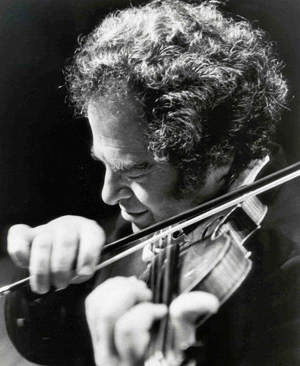Schubert, Franck, Foss, Kreisler:
Itzhak
Perlman, violin, in recital with Rohan De Silva, piano, Zellerbach Hall,
Berkeley, Calif. 30.01.2007 (HS)

At 61, Itzhak Perlman may not be oldest practicing violin
soloist on the world stage. But with so many younger stars
out there, and with his gray hair, he's definitely an
elder statesman, perhaps even a legend.
The golden tone is still there. He still shapes a phrase
so that it has its own little story to tell. Whatever
he plays, he has a clear idea of where it's going. Unlike
some of his younger colleagues, he doesn't try to push
and pull at the music to make it be something it isn't.
He carefully tends the music like a flower and lets its
bloom before our ears.
So why did his recital Tuesday, under the auspices of
Cal Performances at the University of California's Zellerbach
Hall, leave me less than satisfied?
Partly, it was De Silva, who took his assignment as accompanist
to mean he should recede into the background, play all
the notes, and leave the heavy interpretive lifting to
Perlman.
Perhaps it was the program itself. The only piece on it
that could be deemed remotely meaty was the Franck Sonata
in A major. The lightweight opener, Schubert's Rondeau
Brilliant in B minor, and the Coplandesque Three
American Pieces, by Lukas Foss, neither show these
composers at their best nor do they give the violinist
anything nearly as rewarding as similar work by composers
better suited to it.
The Schubert had its moments, but it got to be repetitious.
It's in the mode of showpieces that Paganini or Wienawski
tossed off with abandon. The Foss piece, an early work,
dates from 1944, before Foss explored the edgier material
that made his name. It's in the open-harmony, highly diatonic
mode that Aaron Copland invented and perfected. And he
did it so much better, as did Roy Harris and Walter Piston
and Virgil Thomson and even Leonard Bernstein.
Best
was the Franck, one of the minor gems of the violin literature.
Perlman caught the magic in the wispy opening phrases
and the more delicate moments in the third movement Recitative—Fantasia.
The grandeur of the big tune in the finale had real nobility.
After the lightweight Foss, there should have been a big
finale, perhaps something like the Copland Duo
or the lushly Romantic Samuel Barber Violin Sonata.
But no. "Other works to be announced from the stage,"
said the printed booklet, and we got a grab-bag of seven
bonbons, mostly by and for Fritz Kreisler.
Perlman made a show of selecting the pieces on the fly,
drawing a laugh as he first studied a computer printout
of works he had played in Berkeley for the past 20 years.
"If you had been here 20 years ago, I wouldn't want
you to get a repeat," he announced. The jokes kept
coming. Introducing Tchaikovsky's Chanson sans parole,
he said the composer wrote it for a friend who had been
sent to prison for a long, long time.
It was like having Itzhak in your living room, riffling
through a stack of music to find something to play for
fun, bantering as he fiddled. And some were little gems,
including Kreisler transcriptions of a Gluck aria (which
he did not identify) and the famous Spanish Dance
by Manuel de Falla.
But in the end, it was like having a nice appetizer, a
hearty soup and then a bunch of snacks. Much of the audience
lapped it up. From a violinist of Perlman's stature, I
would have preferred a real meal.
Harvey
Steiman



